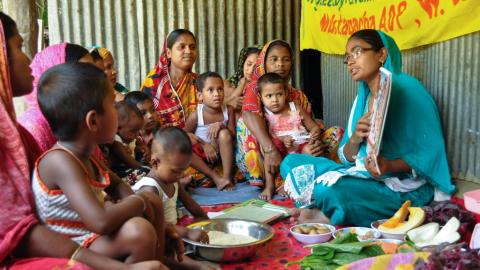
Positive Deviance/Hearth Training
In communities where many young children are growing poorly, World Vision uses the Positive Deviance/Hearth (PD/Hearth) approach to sustainably rehabilitate underweight children. PD/Hearth empowers families and communities to discover and apply local solutions to child malnutrition.
World Vision has developed PD/Hearth training curricula for Master Trainers, Trainers of Facilitators, and Volunteers, including a large practical field component, minimizing cascade trainings by combining all national, provincial, and district level trainings into one. This approach minimizes information loss. The trainings focus on facilitation skills and technical components such as positive deviance inquiry as well as qualitative and quantitative assessment of participants, and include a certification process for trainers.
World Vision has also developed tools to strengthen PD/Hearth technical components, including a menu design calculator and standardized monitoring tools; an Excel database with automatic generation of z-scores, graphs, and tables; and an mHealth application for improving supervision and the quality of service provided by PD/Hearth volunteers.
TRAINING OF MASTER TRAINERS
This PD/Hearth Curriculum complements the CORE PD/Hearth resource materials by helping you to train trainers. It provides all the materials needed for a six-day face-to-face training session. This curriculum ensures that each participant has practical sessions on facilitation, including peer review for facilitation skills, and has practical, in-the-field exercises to ensure that graduates from this program are well qualified to train the essential elements of PD/Hearth. This curriculum is not designed for beginners in PD/Hearth, but to build facilitation and training skills for those who already have exposure to PD/Hearth basics. It will also assist in improving quality control in both PD/Hearth training and programming. This tool also contains a helpful volunteer manual for the graduates of this program to use when they are training volunteers (see Volunteer Training tab below).
Resources to Download:
-
Handouts to accompany Master Trainers Manual
-
Positive Deviance Hearth Menu Calculation Tool
-
World Vision's Positive Deviance/Hearth Database - to be uploaded shortly - please email nutrition@wvi.org to obtain this file
*Please note that these files are web-ready. Please contact us at nutrition@wvi.org for print-ready files.
What skills will participants walk away with?
- Good facilitation skills.
- Experience in essential community work components.
- Skills in teaching essential elements of PD/Hearth.
- Ideas on how best to create an environment for adult learning.
- Ideas on keeping sessions interesting and active.
Source/Quick Link
Nutrition Working Group, Child Survival Collaborations and Resources Group (CORE). Positive Deviance/Hearth: A Resource Guide for Sustainably Rehabilitating Malnourished Children. Washington, D.C., 2002. http://www.coregroup.org/.../Hearth_Book.pdf
PD/Hearth Essential Elements: http://www.positivedeviance.org/...addendum.pdf
TRAINING OF FACILITATORS
This Training of Facilitators curricula provides the framework and materials for a six-day, face-to-face course. It covers all components of the PD/Hearth programme, with emphasis on the essential elements of the methodology and the integration of PD/Hearth into the World Vision Area Development Programme (ADP) context. There is more content included in this manual than can be covered in the six days, so facilitators will need to decide which activities are most relevant to the participants and organise their time accordingly.
Resources to Download:
- Training of Facilitators Handouts
- Positive Deviance Hearth Menu Calculation Tool
*Please note that these files are web-ready. Please contact us at nutrition@wvi.org for print-ready files.
Participants should have an existing understanding of PD/Hearth principles and concepts as well as experience in implementation. They are expected to personalise this curriculum throughout the course and to adapt the method of presentation for use in their particular context. A group size of 20 participants is recommended in order to maximise interaction and feedback.
Some sessions are held in a classroom setting; others are based in the field, collecting and using field information. Although not absolutely necessary, access to computers during the sessions on calculating nutritional status and the menu calculation exercise could be helpful. Access to a community where there are malnourished children and where community members are willing to work with training participants is necessary. This community, in any World Vision ADP, should be within close proximity to the training site (no more than one hour away).
VOLUNTEER TRAINING
This training curricula contains the information needed to conduct a five-day face-to-face training programme to equip PD/Hearth volunteers prior to starting the programme, with a sixth day of training to be held after the first week of Hearth implementation. The goal is to train PD/Hearth volunteers who will be competent and confident to guide and support caregivers to rehabilitate their malnourished children and prevent future malnutrition. Most sessions involve hands-on practice of the skills and knowledge volunteers will need to help caregivers learn.
Resources to Download:
*Please note that these files are web-ready. Please contact us at nutrition@wvi.org for print-ready files.
The curriculum and exercises have been developed based on field experience from many countries in all regions of the world. Adult learning methodologies with practical examples, exercises, role plays and field visits reinforce the principles of strong PD/Hearth programmes. Facilitators should have experience applying adult learning methodologies as well as a thorough understanding of PD/Hearth principles, and preferably, implementation experience.